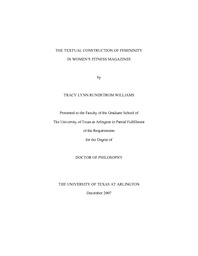
ATTENTION: The works hosted here are being migrated to a new repository that will consolidate resources, improve discoverability, and better show UTA's research impact on the global community. We will update authors as the migration progresses. Please see MavMatrix for more information.
Show simple item record
| dc.contributor.author | Rundstrom Williams, Tracy Lynn | en_US |
| dc.date.accessioned | 2008-04-22T02:41:26Z | |
| dc.date.available | 2008-04-22T02:41:26Z | |
| dc.date.issued | 2008-04-22T02:41:26Z | |
| dc.date.submitted | November 2007 | en_US |
| dc.identifier.other | DISS-1918 | en_US |
| dc.identifier.uri | http://hdl.handle.net/10106/731 | |
| dc.description.abstract | Women in the first decade of the 21st century encounter competing ideologies of traditional femininity and empowered femininity. Language, in particular Discourse Analysis, provides a means for investigating what these ideologies, or discourses, are and how they are perpetuated. One source of language which encodes and perpetuates ideologies of femininity is women's magazines. As pervasive, monthly texts directed specifically at women, women's magazines provide a rich source of contemporary ideologies of femininity. Given the rise of health and fitness magazines over the past 20 years, it appears that one primary focus of contemporary femininity is the body. Previous research has found that the idealized female body today - an extremely thin body - encodes traditional femininity in that it represents social values of beauty, smallness, and others-orientation, but it also encodes empowered femininity in that it represents will-power, dedication, and strength.
Using one fitness instructional text from eight different women's fitness magazines, an analysis of the rhetorical structure, clauses, and lexicon demonstrates how these texts perpetuate a hybrid discourse which actually integrates traditional and empowered femininity. This hybrid discourse appears as a seamless combination of the two "parent" discourses by placing itself in the middle of a continuum between traditional femininity and empowered femininity: emphasizing achievement but to a limited degree, and celebrating beautification and objectification. The hybrid discourse also supports a sociological trend of many women wanting to balance competing demands of portraying highly valued but traditionally male traits while still being seen as traditionally feminine. | en_US |
| dc.description.sponsorship | Orr, W. F. Winnie | en_US |
| dc.language.iso | EN | en_US |
| dc.publisher | Linguistics | en_US |
| dc.title | The Textual Construction Of Femininity In Women's Fitness Magazines | en_US |
| dc.type | Ph.D. | en_US |
| dc.contributor.committeeChair | Orr, W. F. Winnie | en_US |
| dc.degree.department | Linguistics | en_US |
| dc.degree.discipline | Linguistics | en_US |
| dc.degree.grantor | University of Texas at Arlington | en_US |
| dc.degree.level | doctoral | en_US |
| dc.degree.name | Ph.D. | en_US |
Files in this item
- Name:
- umi-uta-1918.pdf
- Size:
- 803.8Kb
- Format:
- PDF
This item appears in the following Collection(s)
Show simple item record


